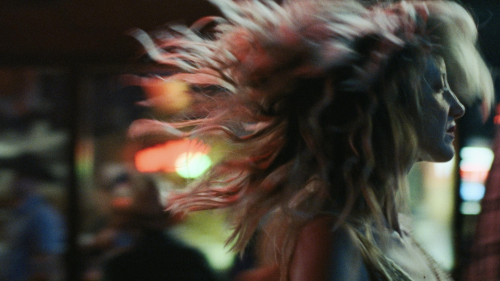
SXSW
MOVIE REVIEW
To Leslie (2022)
There's a section in critic James Monaco’s old book “American Film Now” where he goes out on a shaky limb and plots the then-superstars of movie acting on a diagram of distinct personality types. This comes to mind every time Andrea Riseborough acts in a film and is immediately, defiantly, unclassifiable. Michael Morris’s “To Leslie” catches Ms. Riseborough still barreling forward on the momentum of 2020, the year of Prime Video’s series “ZeroZeroZero” for which they might have melted down a few of the TV acting trophies into one statue just for her. “To Leslie,” written by Ryan Binaco, might garner her a few more plaudits, although this is a showier turn with plenty of awardable elbow room: an English actor charging at full-scale West Texas alcoholic destitution.
“To Leslie” is about the inevitable doom of getting what you want, the title character (Ms. Riseborough) having won $190,000 on the lottery and proceeded to drink or inhale the lot. The film cuts directly from Leslie's cheesy giant-check windfall to her current condition, curled in a defensive ball on a bed in a ratty motel like a sick animal. She assumes a similar pose several times, at one point while technically sat on a bar stool, although she spends much longer periods in those bars getting sloshed and looking for either male companionship or the opportunity to get under someone else's roof. Wedged between arrogance and annihilation, Leslie’s body language is a spectrum of passive-aggressive discomfort. She attempts to reconcile with her son James (Owen Teague), but can't help antagonizing him and his friends within minutes. James packs Leslie off back to her old hometown, scene of her many disasters and within range of the withering scorn of Dutch and Nancy (Stephen Root and Allison Janney), a couple who clearly had their fill of Leslie a long time ago. Only in the company of other sympathetic misfits might redemption lie.
Dramas have dealt with lottery winnings as a curse before; British viewers of suitable vintage will recall the cultural nerve touched by the BBC’s “Spend Spend Spend” about a working class woman who won big on the football pools and fell apart. But in its screening slot at SXSW “To Leslie” faces the modern problem of what sincere treatment of social hardship on screen should be up to in our era of crisp digital clarity and unending content avalanche. What’s the responsibility of any one artistic atom in the building of a better whole: to spur individual empathy or collective action? “To Leslie” is, for better or worse, not interested in indicting the government or the state or the lottery company in Leslie’s fall, or pulling any organized social forces into her possible rescue. The film sticks to the other side of the argument: that Leslie got herself into this mess, bewitched by the idea that 190-grand was enough for a lifetime, and now she’s going to have to get herself out of it. In some alternate version, a British version probably, Leslie would have a disastrous run-in with the clowns at the benefits agency and get sneered at by strangers; but the people sneering at Leslie are her own kith. This is Texas, and as the Coen brothers once observed, down here you're on your own.
Comments